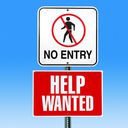Immigration's role in America's labor shortage

America's labor shortage crisis has been exacerbated by immigration restrictions that have reduced the number of both skilled and unskilled workers.
Between the lines: Most of the labor scarcity blame has been aimed at expanded unemployment benefits, hard-to-find child care and low wages. But there is a fourth leg to the stool.
By the numbers: Immigrant and non-immigrant visas issued during the year ended October 2020 were down by nearly five million, or 54%, from 2019.
- 572,587 fewer people received temporary or permanent worker visas (H, L, O, P, Q, J, and E) in 2020, a 44% drop from 1.3 million in 2019.
- The most significant drop-offs were for J and Q visas, for work- and study-based programs like au pairs, camp counselors and cultural exchange. Those were down 68% and 63%, respectively.
- H-visas for specialty work, temporary agricultural and non-agricultural work fell by the smallest percentage (24%).
For context: The U.S. had a 6% job opening rate in April, with the highest rates of 11.6% rate in arts, entertainment and recreation, 10.1% in leisure and hospitality, and a 9.9% rate in accommodation and food services — which combined works out to over 3.1 million unfilled jobs.
Timeline: Almost all of this decrease can be tied to Trump administration decisions to close legal immigration avenues in the pandemic's early months, while also tightening rules and enforcement of undocumented immigration.
- Freezes were put on green card applications in April, and most temporary work visas were halted in June.
- President Biden reversed the green card decision and recently let the worker visa ban lapse.
- But it will take time for the immigrant worker pool to be refilled, particularly as potential immigrants from certain countries remain blocked due to COVID-related health concerns. Moreover, many U.S. embassies and consulates continue to face massive backlogs of visa applications, often without enough resources to resume regular operations.
What they're saying: E.J. Dean, the third-generation owner of New England carnival operator Fiesta Shows, says that he's had to limit the number of rides offered this season because he's been unable to secure his typical supply of temporary workers from overseas (particularly from South Africa).
- "I'm trying to get people locally, but I've never seen things so tight," Dean explains. "It’s not even about the pay. People set up interviews and then they don't show up for them."
- Jon Baselice, VP of immigration policy at the U.S. Chamber of Commerce, adds: “COVID-related travel restrictions continue to prevent many employers from meeting their workforce needs and they are causing significant business disruptions for many companies, especially smaller seasonal businesses across the country that are dealing with acute workforce shortfalls.”
The bottom line: The U.S. economy cannot fully recover from the pandemic if employers can't find enough employees.